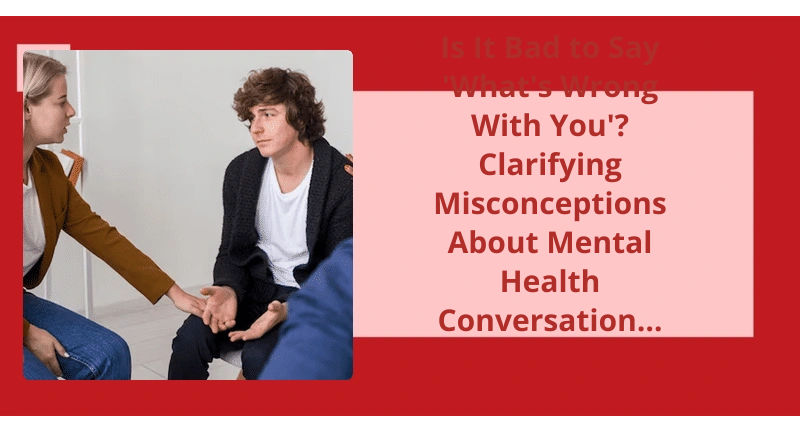As human beings, we often find ourselves engaging in social interactions that require us to respond to the thoughts and feelings of others. In these situations, it's important to be mindful of the type of conversation we're having and how best to respond to it. When someone shares something deep with us, it's essential that we provide a safe and supportive environment for them to express themselves. This might involve simply listening attentively, asking thoughtful and engaging questions, and showing empathy for their experiences. However, when the deep subject matter involves a sad or traumatic event, it requires even more sensitivity and compassion. In these instances, it's important to reassure the person and to let them know that you're there for them. Ultimately, the key is to respond with kindness, care, and genuine interest, while being mindful of the boundaries and needs of the other person.
How Do You Respond When Someone Tells You Their Feelings?
When someone opens up to you about their feelings, it’s important to respond appropriately and with empathy. It takes a lot of courage to be vulnerable and share ones emotions with another person, so it’s important to acknowledge their bravery. One empathetic response that you can try is calling out their courage. For example, you might say, “Thank you for trusting me with this. It takes a lot of bravery to share your feelings.”
Another empathetic response that can be effective is clarifying. When someone shares their emotions with you, it can be helpful to make sure that you understand what they’re saying. You might say, “From what Im hearing, you’re feeling X. Is that accurate?”. By restating their emotions back to them, you can show that you’re actively listening and trying to understand their perspective.
Character boosting is another type of empathetic response that can be effective when someone shares their feelings with you. It can be helpful to remind the person of their strengths and positive qualities. For example, you might say, “You’re so resilient and I’ve no doubt that you’ll get through this.”. By boosting their character, you can help them feel more confident and supported.
Conveying that you care is another important aspect of responding empathetically to someones feelings. It’s important to remind the person that you care about them and that their emotions matter to you. You might say, “I want you to know that I care about you and that your feelings are important to me.”. This can help them feel more heard and seen.
Finally, checking in can be a valuable empathetic response. After someone shares their feelings with you, it can be helpful to follow up and see how they’re doing later on. You might send a text or make a phone call and say, “I just wanted to check in and see how youre doing. Is there anything else you want to talk about?”. This can help the person feel supported and cared for over the long term.
When someone shares information with us, it’s important to respond in a way that acknowledges and appreciates their input. A thoughtful response can encourage further dialogue and strengthen our interpersonal relationships. However, the challenge lies in finding the right words to express our gratitude without sounding robotic or insincere. Here are some tips on how to respond politely when someone tells you something useful.
How Do You Respond to Someone Telling You Something?
As human beings, we’re social animals, and communication is one of the most important aspects of our lives. We’re constantly exchanging ideas, thoughts, and information with others. When someone tells us something, it’s our responsibility to respond appropriately, whether it’s a casual conversation, an important announcement, or a piece of useful information. The way we respond reflects our level of attentiveness, respect, and interest towards the person who shared the information.
When responding to someone telling you something, it’s important to be attentive. This means that you should actively listen to what the person is saying, without interrupting or dismissing their thoughts. For example, if someone tells you about their new job promotion, you can respond by congratulating them and asking them about their new responsibilities. This allows both parties to engage in a meaningful conversation and shows that you’re interested in their life.
When someone shares something useful with you, it’s important to show appreciation for their effort. Saying “thanks for letting me know,” “thanks for informing me,” or “thanks for reminding me that,” shows that you acknowledge the importance of the information they shared, and that you value their contribution to your knowledge base. This simple gesture can go a long way in building strong relationships with others.
Another way to respond politely to someone who shares useful information is by saying “good to know.”. This response conveys that you found the information informative or helpful and that you appreciate the persons efforts in sharing it with you. This phrase also implies that you may use the information in the future, which reinforces the importance of the information for you.
It’s essential to avoid responding in a dismissive or negative manner when someone tells you something, even if the information doesn’t seem useful to you at the time. Remember that what may seem unimportant today could be essential tomorrow. Responding positively and respectfully can help to establish trust and foster better communication in the future.
Responding attentively, showing appreciation, and avoiding dismissive or negative behavior can go a long way in building strong relationships and fostering better communication. Small gestures such as saying “thanks for letting me know,” “thanks for informing me,” “thanks for reminding me that,” or “good to know,” can make a big difference in how others perceive us, and how we perceive them. So next time someone tells you something, remember to respond kindly, respectfully, and attentively.
How to Respond to Negative or Difficult News in a Compassionate and Supportive Manner
- Listen actively and without judgement.
- Offer emotional support and validation.
- Ask how you can help and follow through on any commitments.
- Provide resources and referrals if necessary.
- Encourage self-care and provide suggestions if appropriate.
Source: How to respond politely when someone tells you something …
Interacting with someone who’s expressing their emotions through text can be challenging, but there are several ways to respond effectively without dismissing their sentiments. Here are some tips to help you navigate such a conversation with sensitivity and care.
How Do You Respond to an Emotional Text?
When you receive an emotional text from a friend or loved one, it can be difficult to know how to respond in a way that’s both supportive and effective. However, there are several strategies you can use to respond in a meaningful way.
First and foremost, it’s important to be open to hearing what they’ve to say without judgment. This means not interrupting, not trying to give advice or solutions, and not dismissing their feelings. Simply listen and let them express themselves.
If you need clarification about their feelings, don’t hesitate to ask questions. This shows that youre actively engaged in the conversation and are interested in understanding their perspective.
It’s also important to manage your own emotions during the conversation. While it may be difficult to hear about someone elses struggles, resist the urge to become overly emotional or defensive. Stay calm and focused on being present for them.
Validating what theyre saying can go a long way in making them feel heard and supported. This means acknowledging their feelings and letting them know that you understand how theyre feeling.
Asking follow-up questions can help you gain a deeper understanding of their emotions. This can also help them to process their feelings and come to a greater understanding of what theyre experiencing.
Ultimately, it’s important to keep the focus of the conversation on them, rather than redirecting it to yourself or your own experiences. This means actively listening and responding in a way that’s supportive and validating.
Finally, avoid replying with cliches or platitudes. These types of responses can come across as dismissive or insincere. Instead, focus on responding in an authentic and compassionate way. By following these strategies, you can help support your loved ones during difficult times.
Conclusion
In conclusion, active listening and empathy are key to responding appropriately when someone tells you something deep. Whether in casual conversation or in the face of a sad or traumatic event, it’s important to acknowledge their feelings, reassure them, and provide a safe space for them to share. It’s crucial to be respectful and not pry or judge, so as to establish trust and strengthen the bond of friendship or relationship. Ultimately, taking the time to listen, smile, and ask thoughtful questions can go a long way in honoring someone's vulnerability and fostering meaningful connections.






